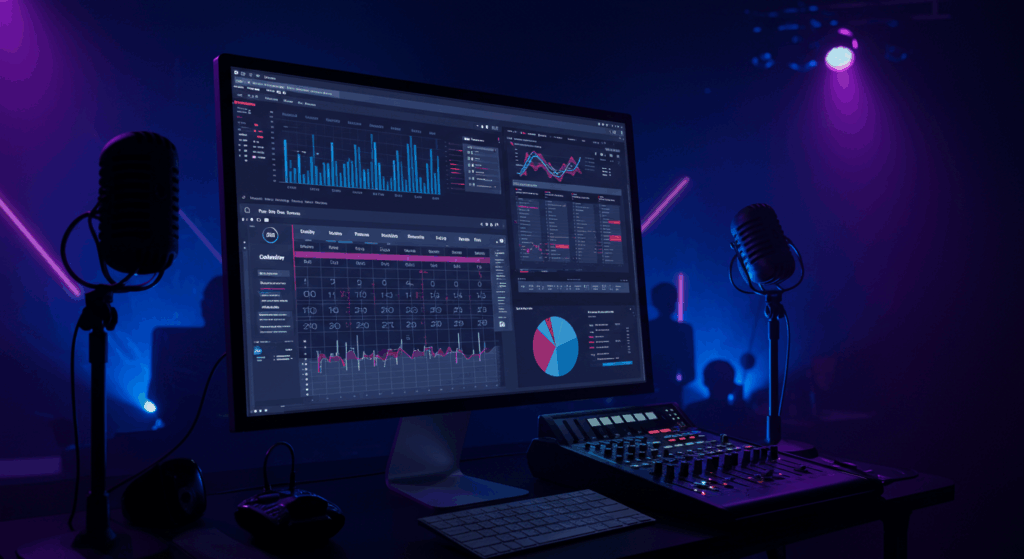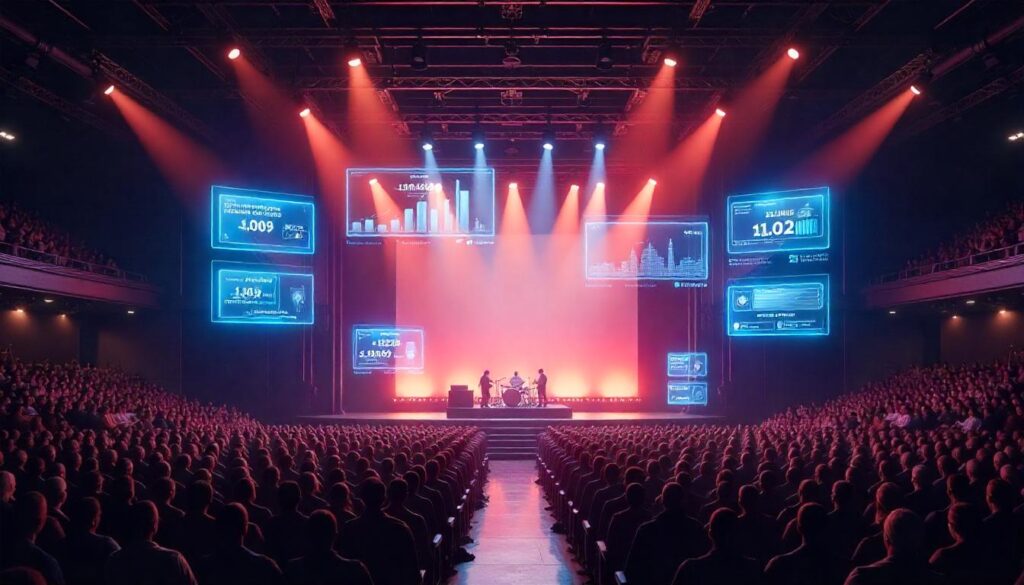
The Rise of Mobile-First Music Venue Management
The live music industry is experiencing unprecedented growth, with revenues reaching over $33 billion in 2023 — a remarkable 25% increase from the previous year. As venues scramble to capitalize on this boom, one technology trend is separating the leaders from the laggards: mobile venue management software.
Music venue owners and managers who embrace mobile-first live music management platforms are discovering they can operate more efficiently, respond faster to opportunities, and deliver better experiences for both artists and audiences. But what exactly makes mobile venue management software so transformative, and how do you choose the right platform for your venue?
Why Mobile-First Venue Management Is No Longer Optional
The traditional approach to venue management — spreadsheets, desktop-only software, and phone calls — simply can’t keep pace with today’s fast-moving music industry. Mobile venue management software addresses critical pain points that venue owners face daily.
Consider this reality: according to recent Music Venue Trust research, venues are managing increasing operational complexity while maintaining razor-thin profit margins, with many spending excessive hours on manual booking and administrative tasks. That’s valuable time that could be spent building relationships with artists, exploring new marketing opportunities, or improving the fan experience.
The rise of mobile technology in live music isn’t just about convenience, but it’s about survival. Venues that can quickly adapt to changes, respond to last-minute requests, and maintain clear communication with all stakeholders are the ones thriving in this competitive landscape.
The Technology Revolution Reshaping Live Music
According to recent industry analysis, Live Nation saw a 36% increase in revenue from 2022 to 2023, with adjusted operating income doubling pre-pandemic numbers. This growth is fueled partly by venues that leverage mobile technology to streamline operations and enhance fan experiences.
Modern venue management software transforms how venues handle everything from initial artist inquiries to final show settlements. Instead of juggling multiple platforms, successful venues are consolidating their operations into unified systems that work seamlessly across devices.
Essential Features of Top Mobile Venue Management Software
Real-Time Calendar Management
The foundation of any effective mobile venue management software is a robust calendar system that provides real-time visibility across your entire operation. Top platforms allow you to manage holds, confirm bookings, and track availability from anywhere, whether you’re in the office, at a show, or traveling to scout new talent.
Advanced calendar features include conflict detection, automated hold reminders, and the ability to share specific calendar views with different stakeholders. This prevents double-bookings and ensures everyone has access to current information.
Integrated Financial Tracking
Managing venue finances through mobile platforms offers unprecedented transparency and control. The best mobile venue management software automatically tracks revenue streams, expenses, and profit margins for each event. Real-time financial data helps venue managers make informed decisions about pricing, artist fees, and operational investments.
Automated settlement calculations save hours of manual work and reduce errors that could damage relationships with artists and promoters. Mobile access to financial data means you can review numbers and approve payments from anywhere.
Streamlined Communication Tools
Effective venue management requires constant communication with artists, agents, technical crews, and venue staff. Mobile-first platforms centralize all communications, creating searchable message histories that prevent important details from getting lost in email chains.
The most effective systems integrate communication directly with show details, allowing team members to discuss technical requirements, schedule changes, and other logistics within the context of specific events.
Top Mobile Venue Management Software Solutions: A Detailed Comparison
Industry-Leading Platforms
Industry-leading platforms built specifically by and for live music industry professionals stand out from generic event management solutions. Unlike general-purpose platforms, purpose-built mobile venue management software understands the unique workflows of music venues, offering features like automated settlement calculations, integrated hold management, and real-time collaboration tools designed for the fast-paced nature of live music.
These specialized platforms’ mobile-first design means venue managers can handle everything from offer creation to final settlements without being tied to a desk. Venue managers report significant time savings and improved accuracy when switching from spreadsheet-based systems.
Tripleseat
Tripleseat focuses primarily on hospitality venues and event spaces, offering mobile capabilities but lacking music industry-specific features like tour routing integration and specialized settlement workflows that music venues require.
Perfect Venue
Perfect Venue provides mobile access to event management features but is designed more for general event spaces rather than live music venues. While functional, it lacks the nuanced understanding of music industry operations that purpose-built solutions offer.
Prism
Prism stands out as mobile venue management software built specifically by and for live music industry professionals. The platform understands unique music venue workflows, offering features like automated settlement calculations, integrated hold management, and real-time collaboration tools designed for the fast-paced nature of live music. The mobile-first design enables venue managers to handle everything from offer creation to final settlements without being tied to a desk. Venue managers report significant time savings and improved accuracy when switching from spreadsheet-based systems.
Platform Feature Comparison
When evaluating mobile venue management software, consider these critical factors:
- Industry Specialization: Generic event platforms often require workarounds for music-specific needs like percentage deals, artist advances, and complex settlement calculations
- Mobile Responsiveness: True mobile-first design versus desktop software with mobile apps
- Integration Capabilities: Seamless connection with ticketing platforms, accounting software, and other tools you already use
- Collaboration Features: How effectively the platform manages communication between venue staff, artists, agents, and technical crews
The Mobile Advantage: Real-World Benefits for Venue Owners
Increased Operational Efficiency
Venues using comprehensive mobile venue management software report dramatic improvements in daily efficiency. Instead of spending hours updating multiple spreadsheets and sending email updates, managers can make changes once and have them automatically reflected across all relevant areas.
This efficiency gain becomes particularly valuable during busy periods when venues are juggling multiple shows simultaneously. Mobile access means critical decisions don’t wait for someone to return to the office.
Enhanced Artist Relationships
Quick response times and professional communication are crucial for maintaining positive relationships with artists and agents. Mobile platforms enable venue managers to respond to inquiries immediately, approve contract changes on the spot, and provide real-time updates about show details.
Industry research shows that venues with streamlined communication processes are more likely to secure repeat bookings and referrals from satisfied artists and agents.
Improved Financial Oversight
Mobile access to financial data allows venue owners to monitor performance continuously rather than waiting for monthly reports. This real-time visibility helps identify trends, spot potential issues early, and make data-driven decisions about future bookings.
Automated financial tracking through mobile platforms also reduces the risk of errors that can lead to disputes with artists or missed revenue opportunities.

Implementation Strategy: Transitioning to Mobile-First Management
Planning Your Migration
Successfully transitioning to mobile venue management software requires careful planning and team preparation. Start by auditing your current processes to identify the biggest pain points and inefficiencies. This analysis will help you prioritize which features matter most for your specific operation.
Consider running parallel systems for a brief period to ensure all team members are comfortable with the new platform before fully committing. Most successful implementations involve training key staff members first, then gradually expanding access to the entire team.
Team Training and Adoption
The most sophisticated software is only valuable if your team uses it effectively. Invest time in comprehensive training that covers not just how to use specific features, but how the mobile platform fits into your overall operational workflow.
Create standard operating procedures that leverage the mobile platform’s capabilities. This might include protocols for updating show information, communicating with artists, and managing financial approvals through mobile devices.
Integration with Existing Systems
Top mobile venue management software platforms offer robust integration capabilities, but successful implementation requires planning how these connections will work in practice. Map out data flows between your venue management platform, ticketing system, accounting software, and other tools.
Proper integration eliminates duplicate data entry and ensures consistency across all systems. This is particularly important for financial data, where discrepancies can create serious problems down the line.
Advanced Mobile Features Reshaping Venue Operations
AI-Powered Analytics and Insights
Leading mobile venue management platforms are incorporating artificial intelligence to provide deeper insights into venue performance. These systems can identify patterns in booking data, predict revenue trends, and suggest optimal pricing strategies based on historical performance and market conditions.
Mobile access to AI-generated insights means venue managers can make informed decisions quickly, whether they’re negotiating with an agent or evaluating a potential booking opportunity.
Cloud-Based Collaboration
Modern mobile venue management software leverages cloud technology to enable seamless collaboration regardless of location. Team members can simultaneously work on different aspects of the same event, with changes automatically synchronized across all devices.
This capability is particularly valuable for venues with multiple locations or distributed teams. Everyone stays informed and aligned without constant meetings or email updates.
Real-Time Reporting and Dashboard Access
Mobile dashboards provide instant access to key performance metrics, allowing venue managers to monitor ticket sales, track expenses, and assess profitability from anywhere. This real-time visibility enables proactive management rather than reactive responses to problems.
Advanced platforms offer customizable dashboards that highlight the metrics most important to your specific business model and goals.
Future Trends in Mobile Venue Management Technology
Integration with Emerging Technologies
The future of mobile venue management software will likely include deeper integration with emerging technologies like augmented reality for venue planning, blockchain for transparent financial tracking, and IoT devices for automated venue monitoring.
Industry projections suggest that venues embracing these technological advances will have significant competitive advantages as the industry continues its rapid growth toward a projected $50 billion market by 2030.
Enhanced Fan Experience Integration
Future mobile venue management platforms will likely offer more direct integration with fan-facing technologies. This could include dynamic pricing based on real-time demand, personalized marketing campaigns managed through the venue platform, and seamless integration with social media for enhanced fan engagement.
Sustainability and Environmental Tracking
As environmental consciousness grows in the live music industry, mobile venue management software is beginning to include features for tracking and optimizing sustainability metrics. This includes monitoring energy usage, waste reduction, and carbon footprint calculations for events.
Why Mobile-First Platforms Outperform Traditional Solutions
Speed and Accessibility
The fundamental advantage of mobile venue management software is speed. In an industry where opportunities can appear and disappear quickly, the ability to respond immediately from any location is invaluable. Mobile-first platforms enable real-time decision-making that traditional desktop-only solutions simply cannot match.
This speed advantage extends beyond just response times. Mobile platforms enable faster onboarding of new team members, quicker implementation of process changes, and more agile adaptation to market conditions.
Scalability for Growing Operations
Mobile-first venue management platforms typically offer superior scalability compared to traditional solutions. As venues grow and add locations or expand their programming, mobile platforms can accommodate increased complexity without requiring fundamental system changes.
Cloud-based mobile platforms also handle increased usage and data volumes more effectively than on-premise solutions, ensuring consistent performance as operations expand.
Cost-Effectiveness
While premium mobile venue management software requires investment, the operational efficiencies and error reduction typically result in rapid return on investment. Studies of venue management software adoption show that venues often recover their software costs within months through improved efficiency and reduced errors.
Mobile platforms also reduce infrastructure costs since they eliminate the need for extensive on-site server installations and IT maintenance.
Essential Mobile Features Every Venue Manager Needs
Document Management on the Go
Effective mobile venue management requires easy access to contracts, technical riders, marketing materials, and other critical documents. The best platforms provide secure, searchable document storage that works seamlessly across devices.
Version control becomes crucial when multiple team members need access to the same documents. Look for platforms that automatically track document changes and prevent conflicts when multiple users make edits.
Task Management and Workflow Automation
Complex events require coordination of dozens of tasks across multiple departments. Mobile-first platforms excel at breaking down large projects into manageable tasks, assigning responsibilities, and tracking progress in real-time.
Automated workflows reduce the chance of missed deadlines or forgotten responsibilities. For example, the system might automatically remind the marketing team to post about an upcoming show or alert technical staff about load-in schedules.
Integration with Communication Tools
While built-in communication features are valuable, the best mobile venue management software also integrates with popular communication tools like Slack, Microsoft Teams, or email platforms. This flexibility allows teams to work within their preferred communication environments while maintaining centralized information management.
Making the Right Choice: Evaluation Criteria for Mobile Venue Management Software
Industry-Specific Functionality
Generic event management platforms often struggle with music industry nuances like percentage-based deals, complex settlement calculations, and tour routing considerations. Prioritize platforms built specifically for live music venues or those with robust customization capabilities.
Consider how well the platform handles industry-standard practices like hold management, percentage deals, guest list coordination, and technical rider management. These features should feel natural and intuitive, not like workarounds.
User Experience and Interface Design
Mobile platforms succeed or fail based on user experience. Look for interfaces that work well on both phones and tablets, with intuitive navigation that doesn’t require extensive training. The best platforms feel familiar to users who are comfortable with popular mobile apps.
Test the platform’s performance under realistic conditions, including slower internet connections and high-usage periods. Your mobile venue management software needs to work reliably when you need it most.
Support and Training Resources
Comprehensive support becomes crucial when your team relies on mobile platforms for critical business functions. Evaluate the vendor’s training programs, documentation quality, and responsiveness to support requests.
Look for platforms that offer multiple support channels, including chat, phone, and email support. The best vendors also provide extensive online resources, video tutorials, and regular user training sessions.
Embracing the Mobile-First Future
The live music industry’s rapid growth creates both tremendous opportunities and intense competition. Venues that embrace mobile venue management software position themselves to capitalize on growth while maintaining the operational efficiency necessary for long-term success.
The transition to mobile-first management isn’t just about adopting new technology — it’s about fundamentally improving how venues operate. From faster response times and better communication to improved financial oversight and enhanced team collaboration, mobile platforms offer advantages that compound over time.
As the industry continues evolving toward a projected $50 billion market by 2030, venues that invest in purpose-built mobile management solutions will be best positioned to thrive. The question isn’t whether to adopt mobile venue management software, but which platform will best serve your venue’s unique needs and growth ambitions.
Ready to transform your venue operations with industry-leading mobile management capabilities? Get started with Prism and discover how the right platform can streamline your operations, improve your team’s efficiency, and help you book more shows than ever before.
Frequently Asked Questions
Q: What makes mobile venue management software different from desktop-only solutions? A: Mobile venue management software provides real-time access to all venue operations from any location, enabling faster decision-making and immediate responses to opportunities. Unlike desktop-only solutions, mobile platforms allow managers to handle bookings, approve payments, and coordinate with teams whether they’re in the office, at a venue, or traveling.
Q: How long does it typically take to implement mobile venue management software? A: Implementation timelines vary based on venue complexity and existing systems, but most venues can be operational within 2-4 weeks. The best platforms offer migration assistance and training programs to ensure smooth transitions from existing systems.
Q: Can mobile venue management software integrate with existing ticketing and accounting systems? A: Yes, leading mobile venue management platforms offer robust integration capabilities with popular ticketing platforms, accounting software, and other business tools. These integrations eliminate duplicate data entry and ensure consistency across all systems.
Q: Is mobile venue management software secure enough for sensitive financial and contract information? A: Professional-grade mobile venue management platforms employ enterprise-level security measures including data encryption, secure authentication, and regular security audits. Many platforms offer more security than traditional desktop-only solutions or spreadsheet-based systems.
Q: What’s the typical return on investment for mobile venue management software? A: Many venues see positive ROI within 3-6 months through improved efficiency, reduced errors, and better booking capabilities. The time savings alone often justify the investment, with additional benefits from improved artist relationships and better financial oversight.

Matt Ford is the founder and CEO of Prism.fm, an Austin-based software company revolutionizing live music event management. With a background in entrepreneurship and a degree from the University of Wisconsin-Madison School of Business, Ford combined his self-taught coding skills with firsthand experience as a concert promoter to address the inefficiencies he observed in the industry. In 2018, he launched Prism.fm, an all-in-one platform designed to streamline operations for venues, promoters, and agencies by replacing cumbersome spreadsheets with integrated tools for booking, financial tracking, and contract management. Under his leadership, Prism.fm has grown significantly, achieving $3 million in annual recurring revenue post-COVID and securing over $15 million in funding . Ford’s commitment to building user-centric solutions has positioned Prism.fm as a trusted partner for over 1,500 venues and promoters worldwide.



